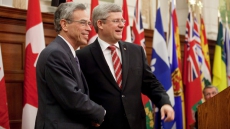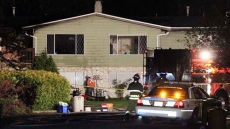At a recent media roundtable, Minister of Education, Peter Fassbender spoke and discussed about the future of education in British Columbia.
The Minister of Education started his introduction saying, “As Minister of Education and MLA for Surrey, I am absolutely feeling the pressure of the growth of this community. It is one of the biggest issues we have to deal with. We have done a lot to try and deal with it. We have invested over 334 million dollars to Surrey alone. With that said, we still have lots of growth.”
Some of the points that he discussed are:
Helping parents/students financially: “We have a number of grant programmes that were recently announced for students who may have limited incomes.
We recently announced supports for single mothers or parents through grants to get their training, which includes everything from child care, to transportation to tuition. We are doing everything we can to help the people who need it the most. We are also looking at other ways in the future where we may have some more attractive loan rates for tuition.”
Implementing a brand new curriculum: “We are introducing a brand new curriculum from Kindergarten to Class 12, which will be fully implemented by September 2016. The new curriculum is really been designed to help every single student be and have the opportunity to be successful.

So, we have reduced the volume of the curriculum. Without losing sight of the fundamentals, we are taking the rest of the curriculum into a much more manageable place, so that we can have more individualised attention paid to the students. It probably is the biggest challenge we have now ahead of us.”
Class size issue: “If you reduce the volume the teacher has to go through, it gives them more time to spend with each of their students. The majority of the classes that are 30 or more are physical education, band or drama, where you want larger classes because you want more participation.
We have caps on our class sizes throughout the system, and we actually have some of the smallest class sizes in the country in B.C. Class size is an issue, and of course the British Columbia Teachers' Federation (BCTF) - the smaller the classes, the more teachers we do have to have. But there is the balance between what’s appropriate and what’s affordable. And we have done a very good job of balancing those two repeating things.”
Financial aid for more schools in Surrey: “We are working with the Surrey School District; and they are doing their long range facility planning. The challenge with growth is that you can project that you are going to have this growth, but until you actually see it happen, you don’t even know how many students you are going to get out of that.

The challenge that the Surrey School District has, as compared to other districts in the province who have declining enrolment, is projecting how fast that growth is going to be, when is it going to be, and how are we going to meet that need.
We have a great relationship with the Surrey School District, they are one of the most progressive in the province and we are working hard with them to do everything we can to have facilities when they are needed. When we can’t have a school, there are times where we have to put modular classrooms on a site.
I have often said that students do very well even in modular classrooms. We all have to recognize that it takes time and significant resources.”
Punjabi language in schools: “The school districts throughout the province can look at individualized programmes. While we do not mandate to a city like Surrey, as the Minister of Education I have met with the city and know that they are doing a long range language strategy as part of their overall strategy in this district.
One of them is the expansion of the Punjabi language schools as well as the other cultural groups that we have.”

Education system of B.C. as compared globally: “We rank number three in the world. We are third only to Japan and Finland. We are number one in the country - we are slightly behind in Quebec with Math outcomes, but if you look at us, we are number one with that one exception in Canada.
Our system in B.C. is seen as being one of the best in the world. We have offshore schools in China; we opened one in Japan. The students who graduate in those schools graduate with a Dogwood certificate which opens the door to any public post secondary institute in the world. That’s one of the reasons we are making the modifications so that we stay ahead.”





